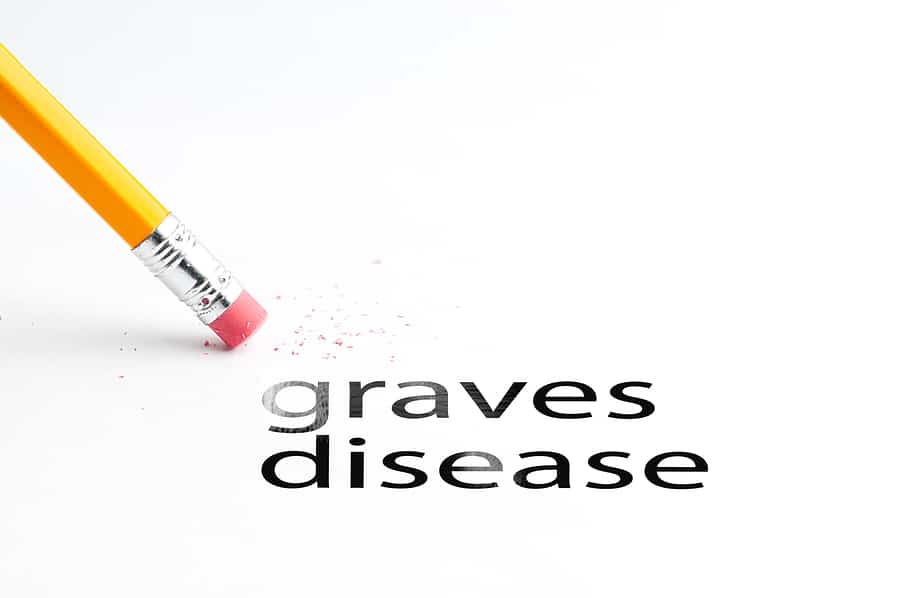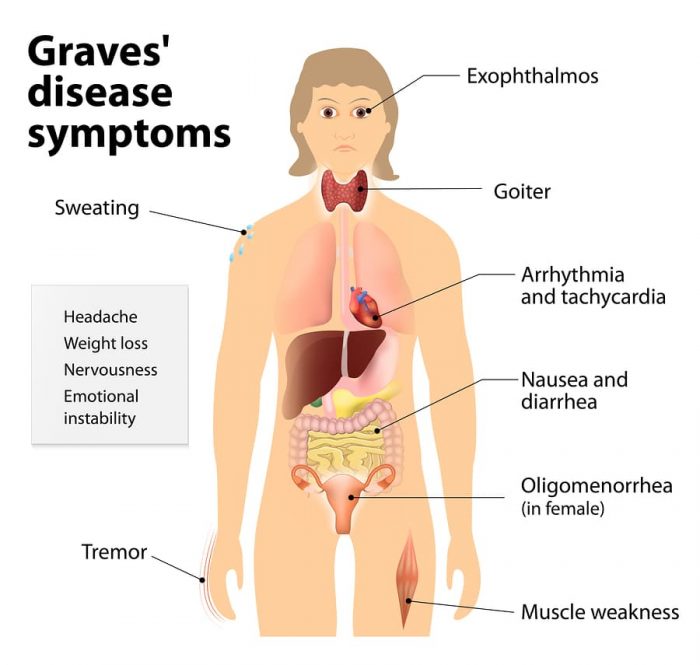Graves’ disease is a form of thyroid disease that affects 1 in every 200 people in the United States. The disease often involves an overproduction of thyroid hormones, which often leads to hyperthyroidism.
Hypothyroidism and Hashimoto’s seem to get all the attention, but I know many of you are suffering from Graves’ disease, so hopefully this article can help clear the confusion and give you some concrete steps to take.
So let’s dive in…
What is Graves’ disease?
Graves’ disease is an autoimmune condition in which the antibody TSI (thyroid stimulating immunoglobulin) is elevated, and often FT4 and FT3 levels are also elevated.
There is often an excess amount of thyroid hormones circulating in the body, which leads to hyperthyroidism.
The TSI antibodies can be present even when TSH, T4, T3, FT4 and FT3 levels are normal.
It’s important to note that many who have Graves’ disease also have Hashimoto’s Disease.
What are TSI antibodies, and what is a “normal” level?
The TSI antibody (sometimes referred to as TRAb or TSHR) is an antibody that mimics TSH by telling the thyroid to make excess FT4. This also often creates an excess of FT3 and a decrease in TSH.
In some cases, the TSI antibody blocks thyroid hormone production instead.
A normal TSI level is <1.
Positive TSI results are strongly indicative of Graves’ disease, but do not always correlate with the presence and severity of hyperthyroidism.
What is TSH, and what is a “normal” level?
TSH is a hormone that the pituitary sends out to tell the thyroid to tell how much or how little thyroid hormones to produce.
Please note: TSH levels tell you what your pituitary is up to, but it’s not telling you what the thyroid is doing.
When it comes to Graves’ disease, TSH levels are often very low because the TSI antibodies are mimicking TSH, telling the body that it has enough TSH when it really doesn’t.
Everyone is biochemically individual, but in our practice we’ve found that a TSH level between 0.5-2.0 is the range where people feel healthy and vibrant.
What is FT4 (free T4), and what is a “normal” level?
FT4 is a hormone produced by the thyroid.
You want FT4 to be in the middle of the lab range. So if the range is 1.0-3.0, you want your FT4 to be 2.0 or close to it. Each lab has a different range, so you have to look at what the specific range is to know what number to look for.
What is FT3 (free T3), and what is a “normal” level?
FT3 is a hormone that comes from FT4. The thyroid makes FT4 and sends most of it to the liver to be converted to FT3. FT3 is the thyroid hormone that goes to every cell of the body.
You want FT3 to be in the middle of the lab range. So if the range is 1.0-3.0, you want your FT4 to be 2.0 or close to it. Each lab has a different range, so you have to look at what the specific range is to know what number to look for.

What are the symptoms of Graves’ disease?
Here is a list of some of the most common symptoms:
Hashimoto’s
Hyperthyroidism
Anxiety
A fine tremor in the hands or fingers
Panic Attacks
Insomnia
Fatigue
Heat sensitivity
Rapid or irregular heartbeat
Sensitivity to heat
Bulging eyes
Sweating
Weight loss
Change in menstrual cycles
Muscle weakness
Diarrhea and frequent bowel movements
Goiter
Why is my TSH too low?
When it comes to Graves’ disease, low TSH can come from two different causes.
- The pituitary, hypothalamus, and adrenals (also called the HPA axis) are all part of the endocrine system and communicate with one another throughout the day. When the body perceives stress, the hypothalamus can signal to the pituitary to make less TSH and in turn the thyroid will produce more thyroid hormones (FT4).
- The TSI antibody mimics TSH, and sends the signal to the thyroid to make excess FT4. This causes the pituitary to send out less TSH.
Keep in mind TSH is a pituitary hormone, so it’s not actually telling you what is going on with the thyroid. FT4 is the level you want to check to see how much thyroid hormone is being produced.
Why is my FT4 high?
Most often, FT4 is high because there is a severe form of either emotional or environmental stress (from things such as synthetic pesticides, toxic metals, and possibly glyphosate).
FT4 can also be elevated because TSI is mimicking TSH and telling the thyroid to make excess FT4.
Why is my FT3 too high?
Most often, FT3 is high because the thyroid is making too much T4 that is being converted to FT3. However, this can also happen when there is toxic overload in the body.
What are some steps you can take to reverse Graves’ disease?
1. Ask your practitioner for a full thyroid panel. Getting a look at what’s actually going on with your thyroid will give you and your practitioner more insight as to what steps to take next.
Here’s the list of labs to ask for (if your doctor won’t order labs for you, you can order them here):
TSH
TPO
TAA
TSI
Free T3 (FT3)
Free T4 (FT4)
Reverse T3
T3
T4
T3 uptake
Total T3
2. Improve your digestion. Graves’ disease is an autoimmune disease, and digestive issues such as low stomach acid, indigestion, chronic heartburn, leaky gut, bacterial infections, etc. can cause this kind of disease. So, it’s imperative that you take steps to heal any gut issues that may be present.
The first way to do this is by eating in a relaxed state, and making sure your body is producing enough stomach acid so it can properly break down and utilize the nutrients in your food.
Stomach acid (also known as hydrochloric acid or HCL) is a necessary part of the digestive process. HCL is the first line of defense against pathogens, bacteria, parasites, etc. It also helps us digest our food properly.
When the body is in a hyperthyroid state, like with Graves’ disease, it’s often necessary to use supplementation while you’re training the body to make enough stomach acid. Here’s an article I wrote that explains the steps to take.
And, here is an article with my top tips for healing your gut naturally.
3. Support your adrenals. Why? Because anyone dealing with thyroid disease is also dealing with some kind of adrenal issue. An adrenal imbalance will cause TSH levels to rise or fall out of the normal range, and it also interferes with proper thyroid hormone production.
Read this article to learn about 20 steps you can take to balance your adrenals. I can’t tell you how many people have taken the steps I list and come back a month or two later telling me how much better they feel!
4. Reduce your sugar intake. Sugar and stress do the same thing to the body (minus the calories), so to help balance your TSH and reduce antibodies, you need to watch your sugar intake. If you’ve got massive sugar cravings right now (I’ve been there before!), make this recipe for buttermints and follow the directions listed.
5. Reduce your chemical load and detox the liver. Most often, a root cause of Graves’ disease is from an overabundance of synthetic chemicals in the body.
First, I recommend switching your skincare, makeup, household cleaning products, etc. to more clean versions. Here’s where you can find a list of my favorites.
Second, it’s important to take steps to gently detox the liver, as this can help calm the autoimmune attack on the body. Detox is an ongoing event, not something you can do in a matter of a few days, so make sure to read this article and see what steps you can integrate into your daily routine.
6. Reduce your stress. Emotional stress is often another root cause of Graves’, so it’s important to look with clear eyes at the stress in your life and take steps to reduce it.
When it comes to emotional stress, I know it can be painful to deal with whatever you’re facing, but it’s a key part of supporting your immune system. Finding a counselor or therapist can be incredibly helpful.
7. Take steps to move away from processed foods, and eat a nutrient-dense grain-free diet. I’ve got hundreds of healthy grain-free recipes here on my site, and another 125 in my cookbook. Eating healthy foods will reduce the strain on your body, reduce inflammation, support the digestive system, and help bring things back into balance.
8. Remember that your practitioner is working for you, not the other way around. It’s ok to ask them questions about the root cause of what’s going on. If they don’t treat you respectfully when you ask them questions about what’s going on with your body, then it’s ok to find another practitioner to work with.
It took me 9 months of going doctor-to-doctor before I found someone who would listen to me and run tests. Being persistent to find the right practitioner to work with pays off!
9. Make sleep a priority. The body cannot heal or properly detox without adequate sleep. If insomnia is an issue right now, read this article and see which steps you can take to improve your quality of sleep.
If you’d like to learn from first steps you can take to help support your thyroid, check out my class, “3 Keys to Thyroid Hormone Balance”. It’s just 45 minutes and I promise you’ll learn something new!
Note: The purpose of this post is to give an overview of Graves’ from a holistic perspective. Due to biochemical individuality there can be many various reasons for the root causes of thyroid disease, and many ways to help improve thyroid in balance in the body. This information is not intended to take the place of your doctor’s advice.








17 Comments